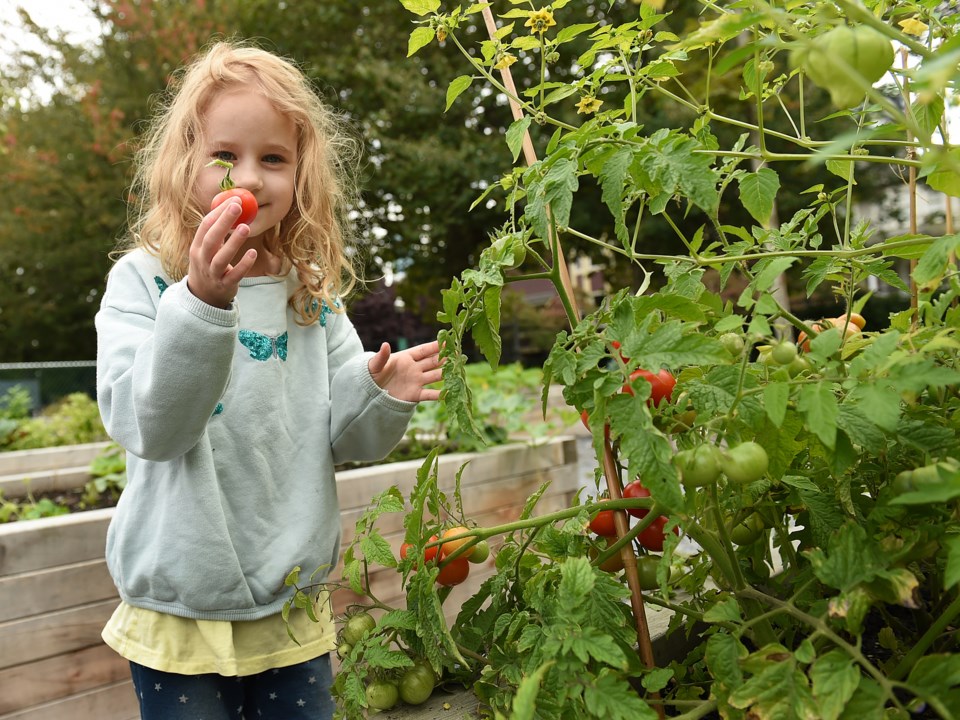If it’s up to the kids, the Earth is in good hands.
Leadership students at Windermere secondary, in East Vancouver, are impressive in their sustainability efforts, which this year include a massive courtyard garden, an onsite orchard and a parade to celebrate sustainability on Earth Day.
At Lord Roberts elementary, in the West End, every student in the school from kindergarten to Grade 5 spends time in “edible education,” a class taught by Brent Mansfield in the school’s vegetable garden, planting, tending and harvesting food that’s fed to 150 students for lunch.
Vancouver students will also be joining global climate leader Greta Thunberg’s school strike for the climate with an event organized by Sustainableteens and Climate Strike Canada on Sept. 27 at City Hall.
While us adults are struggling to even reduce our greenhouse gas emissions the slightest bit — the provincial government reported recently that in 2017 emissions actually went up from 2016 — the kids have got it figured out.
Robin Neill, who says she is six-and-three-quarters years old, likes to eat the peas in the garden. The Grade 2 student asked for a chance to pick a carrot to eat, after exploring the tomatoes, which were ripening to a deep red. She and her classmates are learning about how delicious a tomato ripened in Vancouver in September can be, compared to one shipped here from a foreign land.
The garden gives the students a chance to see where their food comes from, and better yet, they’re usually willing to try vegetables they’ve grown themselves, Mansfield said.
“Food is the most tangible connection we have to the Earth,” Mansfield said. “Food helps us understand who we are and where we come from.”
Not only are they learning to care about the planet, but there are a lot of “secret” lessons that can also be slipped in, like multiplying fractions when doubling a recipe, or doing division when figuring out how many rows of seeds can fit in a raised bed. Reading and social studies are natural matches with gardening and cooking, too.
“Kids are doing every subject with me and they don’t realize what they’re doing,” Mansfield said.
It’s the same for the big kids, over at Windermere secondary, where leadership students and the gardening club grow food on the school grounds, which are home to a fruit tree orchard, with apple, plum, pear and cherry trees, and a vegetable garden, with beds bursting with kale, carrots, tomatoes and green onions.
Last year, leadership students and cafeteria students hosted a community meal, made mostly with produce from the garden and fruit from the orchard, for about 60 guests.
“We also have a wildflower garden, which is all native plants for local pollinators,” said Grade 11 student Hannah Wicki.
Leadership students at Windermere also plan an annual Earth Day Parade and Celebration, beginning in Grade 8, when they build the floats for the parade, which culminates at Grandview Park with speakers, booths and food trucks.
The planning progresses over the years — by Grade 10 and 11, they’re taking care of everything from fundraising to getting permits to organizing the police escorts.
“I think the parade is a good way of involving the community and letting them know that all of our actions impact the Earth,” said Grade 11 student Lili Ouellet.
In Grade 8, the students built an Orca float for the parade from recycled theatre curtains and chicken wire that was reused. In Grade 9, they designed a Jenga-like game to illustrate how species are dependent on each other for survival.
Many families come to the parade, with their children.
“Without realizing it, they are learning about the environment and getting involved,” said Grade 11 student Ava Moyes.
Vancouver school board chairwoman Janet Fraser says she wants to make sure the world her own three children inherit is the best it can be.
“Living in the city, a lot of students are not connected to where their food comes from. We go to a super market and buy our food,” Fraser said. “There’s no magical factory where food comes from. Everything comes from the resources of the Earth.”
The VSB has an Environmental Sustainability Plan, with a vision of making it the “greenest, most sustainable school district in North America.”
Fraser, who was elected under the Green Party banner, hopes to give students the opportunity to learn to love the Earth, as well as to learn how to take action.
“A lot of sustainability actions around facilities and recycling and conservation, that’s great, but the bigger part of it is you have to get into people’s hearts.”
Food is central to human hearts and minds, as well as our very survival. Vancouver’s students are making a strong connection between the planet, their education and their lunches. In the long run, it’s certain to make a difference.



